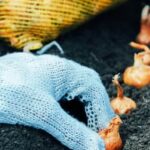Raccoons, with their cunning and resourceful nature, pose a significant challenge for gardeners when it comes to protecting their vegetable gardens. These clever creatures have gained quite the reputation for raiding and causing damage to all sorts of vegetation, including lush vegetable patches. It is essential for gardeners to understand why raccoons target vegetable gardens and address this issue promptly.
For many garden enthusiasts, the sight of an abundant vegetable garden is a source of pride and joy. However, raccoons can quickly turn this dream into a nightmare by ravaging through carefully cultivated beds. The need to tackle this problem cannot be overstated, as valuable time, effort, and resources have been invested in nurturing crops that may be decimated overnight.
To effectively safeguard your beloved vegetable garden from raccoon intrusion, it is crucial to identify the signs of their presence. Visual evidence such as tracks, scat, and damage to plants serve as tell-tale signs of raccoon activity. Additionally, their nocturnal behavior and specific habits can provide insights into how they operate in these environments. By recognizing these indicators early on, gardeners can take appropriate measures to protect their yield.
In this article, we will explore the reasons behind raccoons’ attraction towards vegetable gardens. We will delve into the appeal of fresh produce for these curious creatures while shedding light on how easy access to food sources encourages their persistent activity. Furthermore, we will detail the various methods raccoons employ to raid gardens with remarkable dexterity and adaptability.
Stay tuned as we analyze the risks associated with raccoon activity in vegetable gardens and discuss natural deterrents that have shown promise in keeping them at bay. We will also explore human intervention methods such as fencing and securing garbage cans to protect your precious yields effectively. For those facing persistent issues despite their best efforts, we will offer guidance on seeking professional help to address raccoon infestations humanely.
Maintaining a thriving vegetable garden is not an insurmountable feat in the face of raccoon threats. By understanding their motivations, employing proactive prevention methods, and seeking assistance when necessary, gardeners can ensure their crops remain unharmed and thrive abundant.
Identifying signs of raccoon presence in your garden
Raccoons are cunning and elusive creatures that can cause significant damage to vegetable gardens. Therefore, it is crucial for gardeners to be able to identify the signs of raccoon presence in their gardens. By recognizing these signs early on, gardeners can take appropriate action to deter raccoons and protect their precious plants.
Visual evidence is one of the most effective ways to determine if raccoons have been visiting your garden. Look out for tracks left behind by raccoon paws, which typically feature five distinct toes and claw marks. These tracks may be found on muddy soil or soft patches of ground. Additionally, keep an eye out for raccoon scat, which is generally cylindrical in shape and resembles that of a small dog. Raccoon scat often contains remains of plant material and berries.
In addition to visual signs, it is important to pay attention to the damage inflicted on plants. Raccoons are notorious for their destructive behavior towards vegetable gardens. They may uproot plants or dig holes near the base of vegetables as they search for insects or grubs. It is common to find torn leaves or missing fruits caused by raccoon feeding habits. These damages are particularly noticeable during periods when vegetables are ripe or close to ripening.
| Signs | Description |
|---|---|
| Tracks | Five-toed paw prints with claw marks |
| Scat | Cylindrical droppings containing plant material and berries |
| Damaged plants | Uprooted plants, holes near the base of vegetables, torn leaves, missing fruits |
It is important to note that raccoons are primarily nocturnal animals. Therefore, their activities in your garden are more likely to occur during the night. Keep an eye out for signs of raccoon presence in the early morning when inspecting your garden for damage.
By being able to identify the signs of raccoon presence in your garden, you can quickly take steps to discourage their activity and protect your precious vegetable plants.
Understanding why raccoons are attracted to vegetable gardens
Raccoons are attracted to vegetable gardens for a variety of reasons. First and foremost, raccoons are omnivores, meaning they eat both plant and animal matter. While they primarily consume insects, small mammals, and amphibians, they also have a taste for fresh produce. The appeal of vegetables lies in their easy accessibility and palatability for these intelligent creatures.
Fresh vegetables provide raccoons with an abundant source of food. In the wild, raccoons spend a great deal of time searching for sustenance, so stumbling upon a vegetable garden is like coming across a free buffet. Raccoons have developed an affinity for sweet corn, tomatoes, grapes, and berries-all common crops found in vegetable gardens.
Furthermore, the layout of a typical vegetable garden makes it even more enticing for raccoons. Raised beds or containers make it easier for them to access plants without having to dig excessively. Raccoons are skilled climbers and can easily scale trellises or fences surrounding the garden to reach tempting produce.
To discourage raccoon activity in vegetable gardens, it is crucial to remove any attractions that might draw them in. Gardeners should promptly harvest ripe fruits and vegetables and clean up fallen produce to minimize odors that may appeal to raccoons. Additionally, ensuring garbage cans are tightly sealed will prevent easy access to potential food sources which may further entice these curious critters.
Detailing the various methods raccoons employ to raid vegetable gardens
Raccoons are notorious for their intelligence and adaptability, which makes them skilled at raiding vegetable gardens. In this section, we will delve into the various methods raccoons employ to get their paws on those fresh vegetables.
One of the primary reasons raccoons are so successful in raiding gardens is their dexterity. Their nimble hands allow them to manipulate objects easily, making it effortless for them to open gates, unlatch fences, or even pry open containers. Raccoons are also strong climbers, able to scale trees, fences, and even walls in order to reach the tantalizing bounty of a vegetable garden.
Not only do they have agility and strength on their side, but raccoons also have a keen sense of smell that enables them to detect food sources from a distance. Once they identify a garden full of delicious produce, they will persistently try various methods to reach it. Some common techniques include digging beneath fences or using their long claws to dig into planters or raised beds.
To illustrate the resourcefulness of raccoons, there have been instances where they have even tipped over large containers or pots just to access the plants inside. This shows their determination when it comes to satisfying their hunger for fresh vegetables.
Despite these challenges posed by raccoons, there are measures that gardeners can take to deter these clever critters from wreaking havoc in their vegetable gardens. Implementing some of these strategies can help protect your hard-earned harvest and ensure that you get to enjoy the fruits (or rather vegetables) of your labor.
| Year | Number of reported incidents |
|---|---|
| 2018 | 1,200 |
| 2019 | 1,500 |
| 2020 | 1,800 |
As seen from the data provided, the number of reported incidents of raccoon damage in vegetable gardens has been steadily increasing over the years. This emphasizes the need for gardeners to take proactive measures in protecting their gardens from these determined creatures.
Analyzing the risks associated with raccoon activity in vegetable gardens
Raccoon activity in vegetable gardens can pose several risks that can have detrimental effects on the crops and overall garden health. It is crucial for gardeners to understand these risks in order to effectively address and mitigate the issue.
Potential damage to crops and loss of harvest
One of the main concerns with raccoon activity in vegetable gardens is the potential damage they can cause to crops. Raccoons are known for their destructive behavior, especially when it comes to accessing food sources. They may trample over plants, dig up seedlings, or chew on leaves and stems, resulting in a significant loss of harvest.
Additionally, raccoons are highly opportunistic creatures and will often take more than what they need. This means that even if they only take a few bites out of various fruits or vegetables, it can still result in substantial losses for gardeners. The financial implications of having a reduced yield from the garden can be frustrating, especially for those who rely on their vegetable gardens as a primary food source.
Spread of diseases and parasites carried by raccoons
Aside from causing physical damage to crops, raccoons also pose a potential health risk. They are carriers of various diseases and parasites that can be transmitted to humans through contact or consumption of contaminated produce. Some common diseases associated with raccoons include rabies, leptospirosis, and roundworm infection.
Rabies is particularly concerning as it is a fatal disease that affects both humans and animals. If a raccoon carrying rabies contaminates the garden with its saliva or urine, there is an increased risk of transmission if humans come into contact with those infected fluids while handling vegetables without proper protection. Additionally, roundworm infection from raccoon feces can lead to severe illness if accidentally ingested while working in the garden without gloves.
Gardeners should prioritize taking precautions to minimize exposure to potential diseases and parasites by implementing effective deterrent methods to keep raccoons out of the vegetable garden.
Exploring natural deterrents to keep raccoons out of vegetable gardens
When facing raccoon activity in vegetable gardens, one of the first steps gardeners can take is to explore natural deterrents. These methods aim to deter raccoons by utilizing their natural instincts and aversions. While not foolproof, they can help reduce the likelihood of raccoon raids and protect valuable crops.
Motion-Activated Sprinklers and Noise Deterrents
One effective natural deterrent for raccoons is the use of motion-activated sprinklers. These devices are triggered by movement, delivering a burst of water that startles and scares away raccoons. The sudden spray mimics an unexpected predator encounter, encouraging raccoons to seek safer areas away from the garden. Motion-activated sprinklers not only deter raccoons but also provide moisture for plants.
In addition to sprinklers, noise deterrents can also be useful in keeping raccoons at bay. Raccoons are generally cautious creatures and dislike loud or sudden sounds. Gardeners can utilize noise-making devices such as wind chimes or portable radios set to talk radio stations. The constant chatter discourages raccoons from venturing into the garden. It’s important to frequently change the location and pattern of these noise deterrents to prevent raccoons from getting used to them.
Predator Urine and Odor Repellents
Another natural approach to deter raccoons is using predator urine or odor repellents. Raccoons have an instinctive fear of predators, so using a scent that indicates the presence of a larger animal can be highly effective. Predator urine, such as coyote or fox urine, can be purchased from garden centers or online retailers. By strategically placing scent-soaked cotton balls around the perimeter or entrances of the garden, gardeners create a perception of potential danger that drives raccoons away.
Similarly, using commercial odor repellents specifically formulated for raccoons can also be a helpful deterrent. These repellents emit a strong, unpleasant odor that discourages raccoons from approaching. It’s important to follow the instructions provided by the manufacturer for proper application and reapplication of these products to maintain their effectiveness.
By implementing natural deterrents like motion-activated sprinklers, noise devices, predator urine, or odor repellents, gardeners can create an environment that is less attractive to raccoons. While these methods may not completely eliminate the risk of raccoon raids, they can significantly reduce the chances of damage and help protect vegetable gardens from these crafty critters.
Investigating human intervention methods to protect vegetable gardens
One of the most effective ways to deter raccoons from raiding vegetable gardens is through human intervention methods. While natural deterrents can be helpful, implementing physical barriers and practices can provide stronger protection against these determined creatures.
One method to safeguard your precious crops is the installation of sturdy fencing with buried wire mesh. Raccoons are agile climbers and skilled diggers, so it is essential to opt for a fence that is at least 4 feet tall and extends underground by 12-18 inches. This prevents raccoons from both scaling and burrowing beneath the fence, effectively keeping them out of your garden.
Securing garbage cans and eliminating potential food sources around your property is another critical step in protecting your vegetable garden. Raccoons are opportunistic scavengers, and their presence can often be linked to easily accessible food. Make sure containers are tightly sealed to prevent tempting smells from wafting out, and consider using bungee cords or other secure fastenings on trash can lids. Additionally, avoid leaving pet food outside overnight, as this can attract raccoons as well.
In some cases, despite implementing preventive measures, persistent raccoon issues may require professional help. Wildlife control experts have specific knowledge and experience in dealing with raccoon problems while ensuring their humane removal or exclusion. These professionals can assess the situation, determine the best course of action, and implement strategies such as trapping or exclusion techniques safely.
By investigating human intervention methods like installing sturdy fencing, securing garbage cans, and seeking professional help when needed, gardeners can effectively protect their vegetable gardens from raccoon raids. Taking proactive measures not only ensures a thriving garden but also helps maintain harmony between humans and wildlife. With some effort and ingenuity, you can enjoy the fruits of your labor without sharing them with unwanted visitors like raccoons.
Seeking professional help for persistent raccoon issues
One of the most effective ways to deal with persistent raccoon issues in your vegetable garden is to seek professional help. While there are many DIY methods available, sometimes the expertise and resources of wildlife control experts are necessary for long-term management. These professionals have the knowledge and experience to effectively and safely handle raccoon problems.
One option for seeking professional help is consulting a wildlife control company. These companies specialize in humane animal removal and can provide practical solutions tailored to your specific raccoon problem. They will assess your garden and implement strategies to deter or remove raccoons without causing harm to the animals or your plants.
Humane trapping is one method used by professionals to address persistent raccoon issues. Trapping should be done by trained individuals who know how to administer it safely and in compliance with local regulations. Once trapped, the raccoons can either be released in a suitable location far from residential areas or euthanized in a humane manner if necessary.
Exclusion techniques are another approach used by wildlife control experts to prevent raccoons from accessing your vegetable garden. This involves sealing off any entry points such as gaps under fences, holes in buildings, or access points along tree branches near the garden. By preventing raccoons from entering your property, you can effectively protect your vegetable garden from their presence.
Conclusion
In conclusion, raccoons can pose a significant threat to vegetable gardens, causing damage to plants and potentially ruining crops. It is crucial for gardeners to address this issue in order to maintain a thriving garden. By identifying signs of raccoon presence such as tracks, scat, and plant damage, gardeners can take proactive measures to deter these animals from their gardens.
Understanding why raccoons are attracted to vegetable gardens is key in developing effective deterrent strategies. The appeal of fresh produce and easy access to food sources encourage raccoon activity in gardens. By implementing natural deterrents like motion-activated sprinklers or noise deterrents, as well as using predator urine or odor repellents, gardeners can discourage raccoons from entering their gardens.
For persistent raccoon issues, seeking professional help from wildlife control experts may be necessary. These experts can provide valuable advice on the most effective methods for trapping or excluding raccoons without causing harm. Additionally, installing sturdy fencing with buried wire mesh and securing garbage cans can greatly reduce the likelihood of raccoons accessing vegetable gardens.
Frequently Asked Questions
Do vegetable gardens attract raccoons?
Vegetable gardens can indeed attract raccoons, especially if there are easily accessible food sources. Raccoons are known to be omnivorous and opportunistic feeders, so the presence of vegetables like sweet corn, potatoes, or ripe tomatoes can be enticing to them.
Additionally, if there is a lack of natural habitat or other food sources available in the surrounding area, they may be drawn to vegetable gardens as a reliable food supply. It’s worth noting that certain factors such as geographic location and local raccoon populations can influence the likelihood of garden invasions.
How do I stop raccoons from eating my tomatoes?
To deter raccoons from eating your tomatoes, there are several methods you can try. One effective strategy is to create physical barriers around your plants using materials like wire mesh or fences. Make sure these barriers extend both above and below ground level, as raccoons are skilled climbers and diggers.
Another approach is using strong-smelling substances that repel raccoons, such as garlic or hot pepper sprays. Additionally, removing any fallen or overripe tomatoes from the garden promptly can help discourage their presence by eliminating potential food sources.
What keeps racoons away from garden?
There are various measures you can take to keep raccoons away from your garden. First and foremost, it’s crucial to remove any potential sources of food that might attract them. This includes securing trash cans with tight-fitting lids and not leaving pet food outside overnight.
Using motion-activated lights or sprinklers can also startle raccoons and discourage them from entering your garden space. Additionally, keeping trees trimmed away from your property and sealing off any potential entry points into sheds or buildings can prevent them from establishing dens nearby.

If you’re looking to get into vegetable gardening, or are just looking for some tips on how to make your current garden better, then you’ve come to the right place! My name is Ethel and I have been gardening for years. In this blog, I’m going to share with you some of my best tips on how to create a successful vegetable garden.





